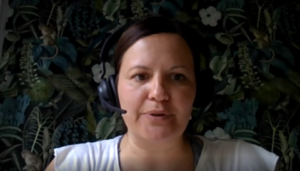Special UBC General Conference (General Assembly) was held online on 20 May 2022, 14.00-15.00 CET. The topics of the Conference were: membership of Russian cities, establishing of the new UBC Commission on Education ‘Learning Cities’, accepting a new associated membership of the City of Vilnyansk (Ukraine), and information about the loss of infrastructure in Ukrainian cities.
In the beginning of the General Conference, President of UBC Mantas Jurgutis asked that the representatives hold a minute of silence for the victims and the Ukrainian people.
Membership of Russian cities
On 24 February 2022 Russia launched a full-scale invasion of Ukraine. Thousands of innocent civilians, including women and children have been dying due to bombing of housing estates, schools, hospitals. The humanitarian situation is dramatic, people are hiding from bombs in cellars without food, water or heating. Over 6 million of Ukrainians have been forced to flee abroad.
In the face of such a huge tragedy, the UBC Executive Board had a Special Board meeting on 7th of March and found the cooperation impossible, so took these decisions until the Special General Assembly makes final decisions.
In the Special Board meeting the Board decided:
1) To suspend membership of the Russian cities
2) To terminate the cities’ positions in the UBC organs/bodies
3) To change the location of the next UBC General Conference.
Proposal for the final decision in the Special General Assembly:
1) The General Conference to vote on suspension or termination of Russian cities membership.
2) To support the Board decision on terminating the Russian cities’ positions in the UBC organs/bodies.
3) To approve the Board decision on changing place of the GC and by same decision to call for
The UBC member cities will cast their votes on these issues and scanned voting forms are sent to UBC Secretariat by 23 May 2022.
The issue of Russian member cities evoked much conversation among the representatives of UBC member cities:
– It is not a good position to be in – UBC is an organization based on friendship. And what we are seeing now in Ukraine is obviously not friendship so some action needs to be taken. (…) We are still in favor of the decision of the Board. The main reason for voting for suspension is that within the next months or 1–3 years we might see that it will be another regime in Russia, stated Jorgen Kristiansen from the City of Kristiansand.

– I am still in favor of this (suspension) because that is a decision many organisations have made, it is in accordance with others, for example the National Coordinator Group for the EU Strategy for the Baltic Sea Region made the decision about suspension with Russia. I think at this point after so many weeks it wouldn’t make such a big difference in practice, stated Elina Rantanen, representing the City of Turku.
– I think we should also plan for the future. (…) So I hope we can have cooperation with all cities around the Baltic Sea. From my side, I support what Jorgen said before. I agree with him for suspension of the Russian cities, continued Roger Kaliff from the City of Kalmar.
– Our City Council decided to freeze all cooperation with out Russian twin cities and other collaborations we have with the Russian side, not to terminate. The reason is we believe that those kinds of collaborations are based on people-to-people relations. When we have collaboration with the Russian side it is not because we like the regime, it is because we want to have normal relations with the Russian people, which is completely different. And we have the same opinion here in the UBC. So we vote for the suspension of the Russian cities’ membership from the organization, stated Daniel Smirat, representing the City of Luleå
– On behalf of the Latvian cities who are members of the UBC network, we are in support of termination of these relationships. (…). To explain why we see it like that, also in the city governments those are political leaders who are in charge. And the political leadership on all the levels do support the existing political regime in the Russian Federation which has launched the war against Ukraine. (…) I can’t imagine that in a week’s, in a month’s, in a year’s time they will say “oh no, that was a mistake that we supported the war”. Those must be different people. Those must be different personalities whom we will continue our dialogue and cooperation with. (…) We are in support of terminating the relations, said Linda Ozola from the City of Riga.

– There is no coming back to before 24th of February. We have to start this cooperation again, from the beginning, from the scratch, and based on new values because we have to build our cooperation on values. For me, suspension and waiting until the end of the war is not the direction we should go within the UBC. (…) If there will be common values within Russia then we should start from the beginning and start this cooperation based on values. (…) So we are of course for termination of membership of Russian cities, continued Piotr Grzelak, representing the City of Gdańsk.
UBC President Mantas Jurgutis closed the discussion with his words:
– As UBC President I respect all opinions and will follow the majority decision. (…) I believe the biggest value we have is the unity, the strength, and the experiences we share all together. (…) kindly ask all the General Assembly in any decision we make to stay together, and if we have more discussion needed I assure as the President that it will be as much as needed.
The voting results were:
25 for termination
13 for suspension
As a result, the membership of St. Petersburg and Gatchina has been terminated.
New UBC Commission on Education ‘Learning Cities’
The UBC Executive Board was asked to establish a temporary UBC Commission on Education, the Learning Cities Commission. The task of the temporary commission was to carry out the work plan of the Task Force on Youth Employment and Well-being, and to prepare for the General Conference (Assembly) a proposal of a new commission along with its long-term objectives. The proposal is supported by six UBC member cities: Liepaja (Latvia), Naestved (Denmark), Riga (Latvia), Rostock (Germany), Turku (Finland) and Aarhus (Denmark).
– There is a need to continue and further develop the work of UBC Task Force on Supporting Youth Employment and Well-Being. Education is the best way to combat the social exclusion of children, young persons and adults, said Matti Mäkelä, Head of the Project Management Office at Education Division in the City of Turku.
Already 12 UBC cities are involved in the Learning Cities Commission. After hearing the presentation of Matti Mäkelä, the General Assembly decided to establish the new UBC Learning Cities Commission.
Associated membership of the City of Vilnyansk (Ukraine)
On 4 April 2022, the Executive Board accepted City of Vilnyansk as an Associated City of UBC.
Vilnyansk is located in the northeastern part of the Zaporozhye region. It has 14,580 inhabitants. The main industries are machine, chemical and farming industries. Industrial potential is realised through a number of companies. Among the most recognized cultural sites, there are: St. Vladymyr Christian Orthodox Temple, Memorial for those who perished during WW2 and Afghanistan War (1979-1989), Chornobyl Memorial, Aaron Garden Monument to the Victims of Holocaust and Military captives. Vilnyansk offers many green areas to its inhabitants, e.g. the Jubilee Park (17 ha) with over 3.500 plant species.

– An outstanding event took place for our community when we became and Associated Member of the Union of the Baltic Cities. (…)Together with this community, we can reach our inmost desire to become much better and environmentally clean place and we invite you to be our guests, stated Natalya Musienko, Mayor of Vilnyansk.
– The citizen countries of the Baltic have given their friendly and reliable shoulder to our city and our whole country that showed who are really brotherly nations to us. (…) Let me say thank you to all of you, Mayor Musienko continued.
Information about the loss of infrastructure in Ukrainian cities
Since the beginning of the war, Ukraine has suffered major losses in lives and infrastructure. Among them, the City of Mariupol has suffered the most. There are currently 94,3 billion dollar damages to physical infrastructure and 564–600 billion dollar overall economic losses due to the war – and the numbers are rising.

Many UBC cities are helping Ukrainian cities by sending e.g. buses, money, medicines, food, water and sewage equipment, building machines and many other supplies.
The direct damage caused to Ukrainian infrastructure was presented by Anatolii Komirnyi, Deputy Minister of Infrastructure of Ukraine.
– Thank you for your everyday support, it is really needed, Deputy Minister Komirnyi stated.
– We will launch an initiative with the Presidium to those cities who focus on humanitarian aid or any help to Ukraine. We can make a task force on co-ordinational information so that we could strengthen the ties, responded UBC President Mantas Jurgutis.
Towards the future
UBC Special Online General Conference was held due to the circumstances that the whole Europe is facing since Russia’s attack in Ukraine.
– I am sure the decisions we are going to have will only strengthen us as a union, not separate us. I trust that the 30 years of experience we have and our strong team will help us to get out of any crisis and I am sure that at the moment regional cooperation is more important than ever, because common voices and common shoulder-to-shoulder helps crucially every day. That is why we are here and no matter what happens, the UBC will be here, President Jurgutis stated in his closing words.


